Detective Alternatives
Explore 10 alternatives to Detective. This guide compares features, pricing, and use cases to help you find the right tool for your business.

Many sales teams use Detective for good reasons. It excels at automating account research and surfacing sales triggers, which helps you craft relevant messages without hours of manual work. This makes outreach much more effective and timely.
But like any tool, it has limits. Some users report that information can be outdated or that the initial setup feels clunky. We analyzed the best alternatives based on G2 reviews to help you shortlist options for a deeper review. Let's get started.
Consider 11x for Your Sales Team
For teams that want to use digital workers in their sales process, 11x offers autonomous AI agents. They handle repetitive tasks like account research, data entry, and CRM management.
Your sales representatives can then concentrate on client relationships and deal closure. If you explore this model, 11x is a relevant option to review for your specific needs.
At 11x, we provide a unified GTM platform where AI agents manage your sales process. Our agent, Alice, finds prospects and handles outreach, while Julian qualifies leads and books meetings. We replace separate tools for data enrichment and outreach by consolidating them into one platform.
Detective Alternatives
The following section provides a detailed breakdown of each Detective alternative. We examine pricing, core features, and the main benefits and potential drawbacks to guide your evaluation process.
1) Clearbit
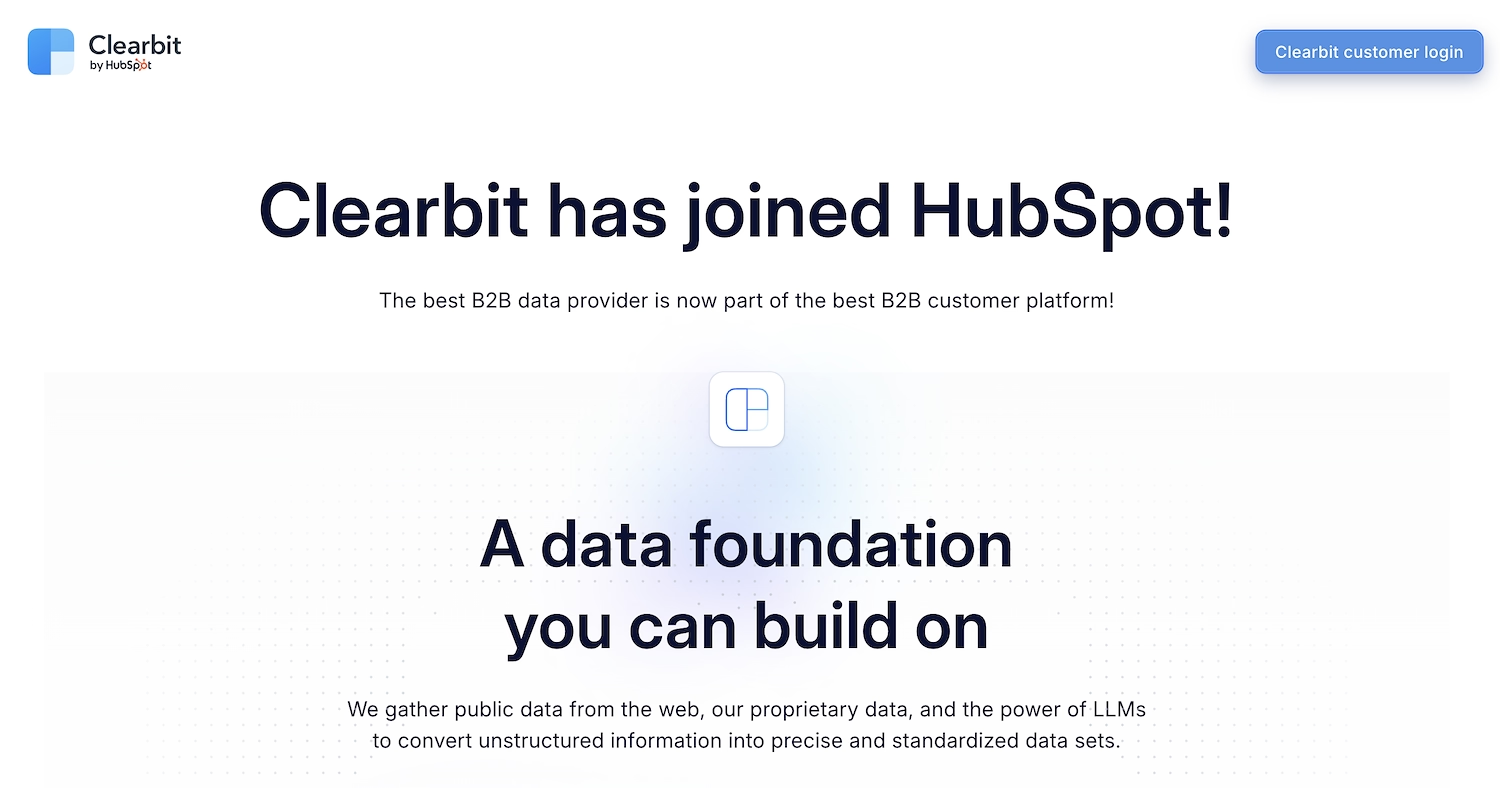
Clearbit, now part of HubSpot, provides B2B data for go-to-market teams. It collects public and proprietary data, then uses LLMs to create standardized datasets. This data foundation supports AI initiatives inside HubSpot.
Use cases include real-time lead qualification and routing. The service also identifies anonymous website visitors who show an intent to purchase and enriches CRM records to maintain a single source of truth.
Clearbit's Main Features
The platform enriches records with firmographic and demographic details, combining multiple data sources for coverage and precision.
It provides real-time lead scoring and routing using data points like 6-digit NAICS codes, corporate hierarchy, and normalized job roles.
Its IP intelligence feature de-anonymizes website traffic to reveal visiting companies that match an ideal customer profile.
The service shortens web forms by automatically enriching fields, which reduces friction and helps increase conversion rates.
How Clearbit Compares to Detective
Average Review score: 4.4/5 stars based on 626 G2 reviews.
Clearbit enriches records with over 100 data points, which provides a different level of detail compared to the sales triggers that Detective surfaces.
It identifies anonymous companies that visit your website, a feature that offers an additional source of leads beyond Detective's account research.
The platform shortens web forms by auto-filling fields, which helps increase lead conversion rates directly on your website.
Its deep integration with HubSpot creates a more unified workflow for teams that use this specific CRM for their operations.
Clearbit's Limitations Compared to Detective
Clearbit focuses on data enrichment and does not surface sales triggers. This is different from Detective, which finds buying signals like funding news to help sales teams time their outreach.
It provides raw data points for enrichment rather than a synthesized brief for account research. Detective, in contrast, automates research to build a narrative that prepares sales reps for calls.
The tool's deep integration with HubSpot can be a drawback for teams that use other CRMs. This is a key difference from platforms designed for broader, multi-CRM compatibility.
Budget and Pricing Considerations
Detective provides clear, per-seat pricing at $50 per month, making it a predictable option for teams. Clearbit does not publish its prices, which points to a higher-cost, custom model suited for enterprise-level deployments that require a tailored quote.
2) Hunter
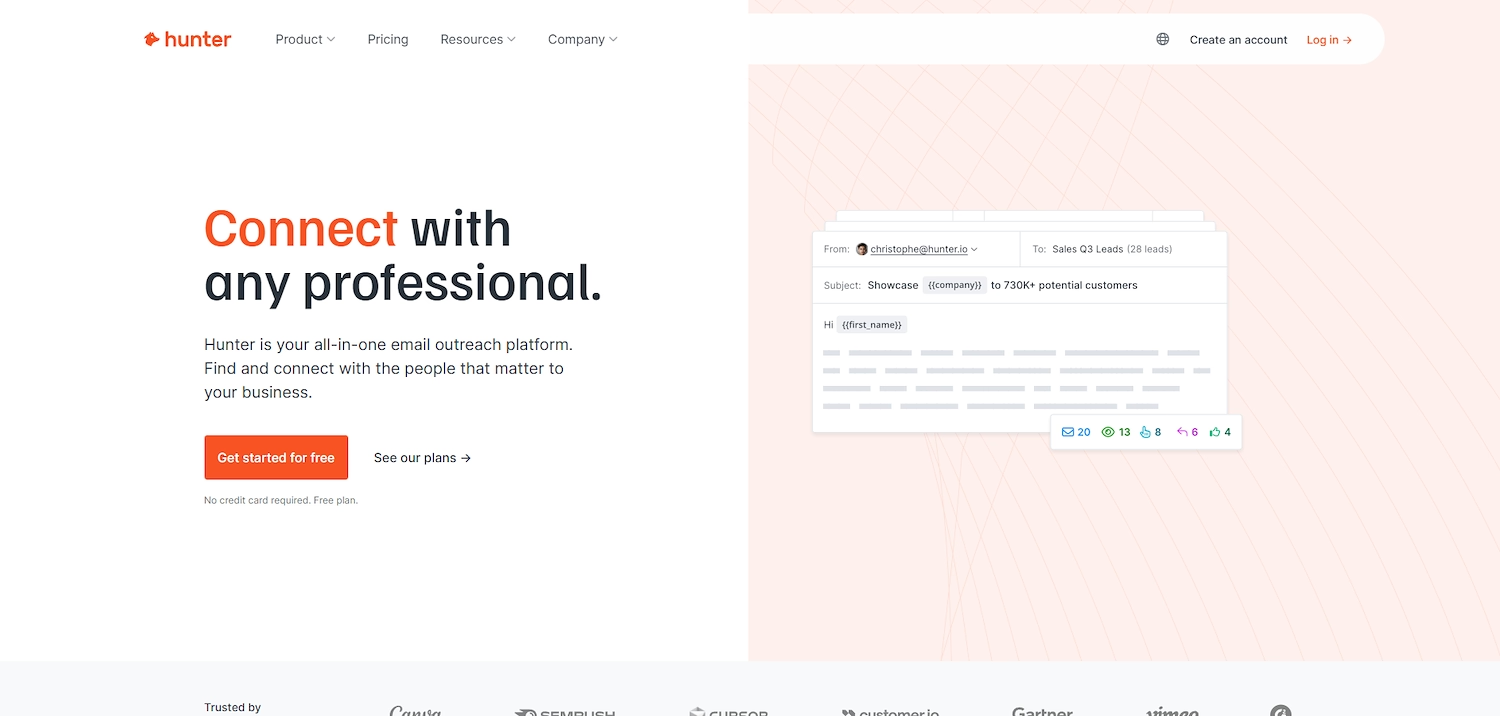
Hunter is an all-in-one platform for email outreach and lead generation. It combines proprietary technology and AI to help businesses identify B2B prospects and locate their verified email addresses. The service also supports cold email campaigns and helps with data compliance.
Businesses use it to build targeted prospect lists for outbound sales and find decision-makers at specific companies. A dedicated module surfaces prospects who show buying signals, which helps teams time their outreach.
Hunter's Main Features
The platform's Email Verifier validates email lists to reduce bounces and protect sender reputation.
Its Campaigns module provides a suite to compose personalized messages, schedule follow-ups, and track performance.
The Domain Search feature returns all publicly available email addresses from a given domain name or URL.
A TechLookup tool identifies websites by the technology stack they use for more targeted prospecting.
How Hunter Compares to Detective
Average Review score: 4.4/5 stars based on 592 G2 reviews.
Hunter includes an Email Verifier to validate email lists, which helps protect your sender reputation. This is a data accuracy feature that Detective does not offer, as it focuses on research synthesis.
It provides a built-in Campaigns module to send and track cold email sequences. Detective prepares you for outreach with research but requires a separate tool to execute the campaigns.
The platform's TechLookup tool identifies prospects based on their technology stack. This provides a different targeting method from Detective, which surfaces sales triggers like company news and funding.
Hunter offers a free plan and multiple public pricing tiers, which gives teams more entry-level options. This is different from Detective's single, per-seat monthly price.
Hunter's Limitations Compared to Detective
Hunter provides raw contact data, which requires manual research. Detective, in contrast, automates account research and creates a synthesized brief to prepare sales reps for calls.
The tool focuses on email discovery and verification. It does not surface timely sales triggers like funding announcements or leadership changes, a core feature that Detective provides for outreach timing.
Its campaign module helps send emails, but it does not generate the sales narrative. Detective provides the story and talking points from its research, which helps sales reps personalize their outreach.
Budget and Pricing Considerations
Detective offers a single plan at $50 per seat per month, while Hunter provides a tiered model with a free option and a Starter plan at $49 per month. This makes Hunter more flexible for various needs, whereas Detective's flat rate is simpler for teams requiring unlimited access per user. For detailed pricing, visit Hunter's official website.
3) ZoomInfo SalesOS
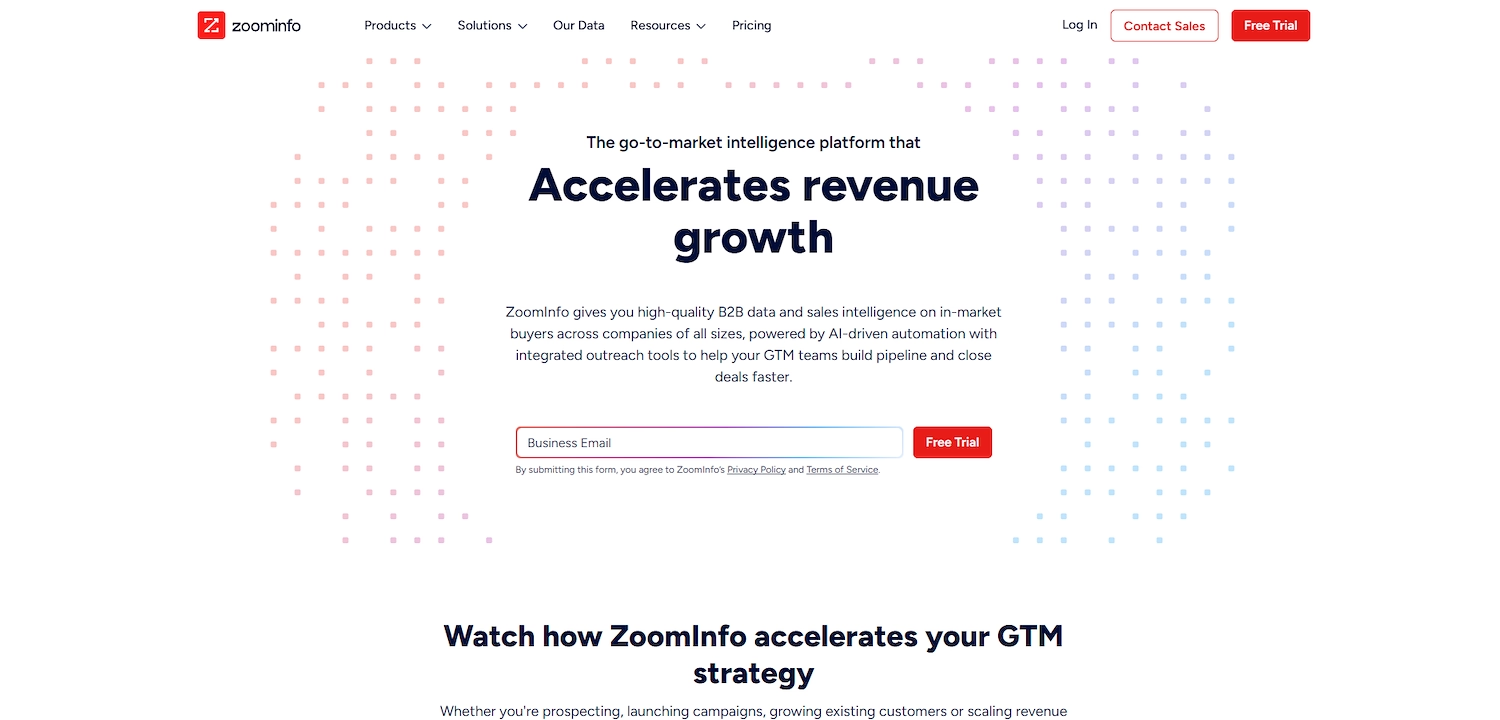
ZoomInfo SalesOS is an AI-powered go-to-market platform for B2B companies. It unifies company data, contact information, and buyer-intent signals into a single system. Revenue teams use it to identify in-market accounts, build prospect lists, and connect with valuable buyers.
The platform also provides engagement and automation tools. It functions as a unified operating system for sales, marketing, and other GTM teams.
ZoomInfo SalesOS's Main Features
Analyzes every call and meeting interaction using its Conversation Intelligence feature.
Offers sales automation tools to manage phone and email outreach sequences.
Identifies anonymous website visitors and tracks their on-site activity to build pipeline.
Includes a generative AI companion, Copilot, that surfaces insights and drafts outreach.
How ZoomInfo SalesOS Compares to Detective
Average Review score: 4.5/5 stars based on 8,738 G2 reviews.
ZoomInfo SalesOS provides a large, frequently updated database of company and contact data. This is different from Detective, which synthesizes research from external sources instead of maintaining its own database.
The platform includes sales automation tools for email and phone outreach. This allows teams to act on insights within the same system, while Detective requires a separate tool for engagement.
It offers a conversation intelligence feature to analyze calls and meetings for insights. This provides post-interaction analysis, a different function from Detective's pre-call research preparation.
Its AI companion, Copilot, gives direct recommendations on who to contact and what to say. This contrasts with Detective, which delivers a research brief for the sales rep to interpret.
ZoomInfo SalesOS Limitations Compared to Detective
ZoomInfo SalesOS offers raw data that reps must analyze themselves. Detective differs by automating research to provide a synthesized brief, which prepares reps with a ready-to-use narrative for their outreach.
The platform identifies broad buyer intent signals from online activity. This is different from Detective, which surfaces specific, timely sales triggers like funding news or executive changes that create clear reasons to connect.
The tool focuses on its large database and engagement features. This approach does not generate specific talking points for a sales call, a core function that Detective provides through its automated research.
Budget and Pricing Considerations
Detective offers transparent pricing at $50 per seat per month, making costs predictable. ZoomInfo SalesOS uses a custom, quote-based model for its enterprise-level platform, so pricing is not public. For an accurate quote, visit ZoomInfo SalesOS's official website.
4) Apollo.io
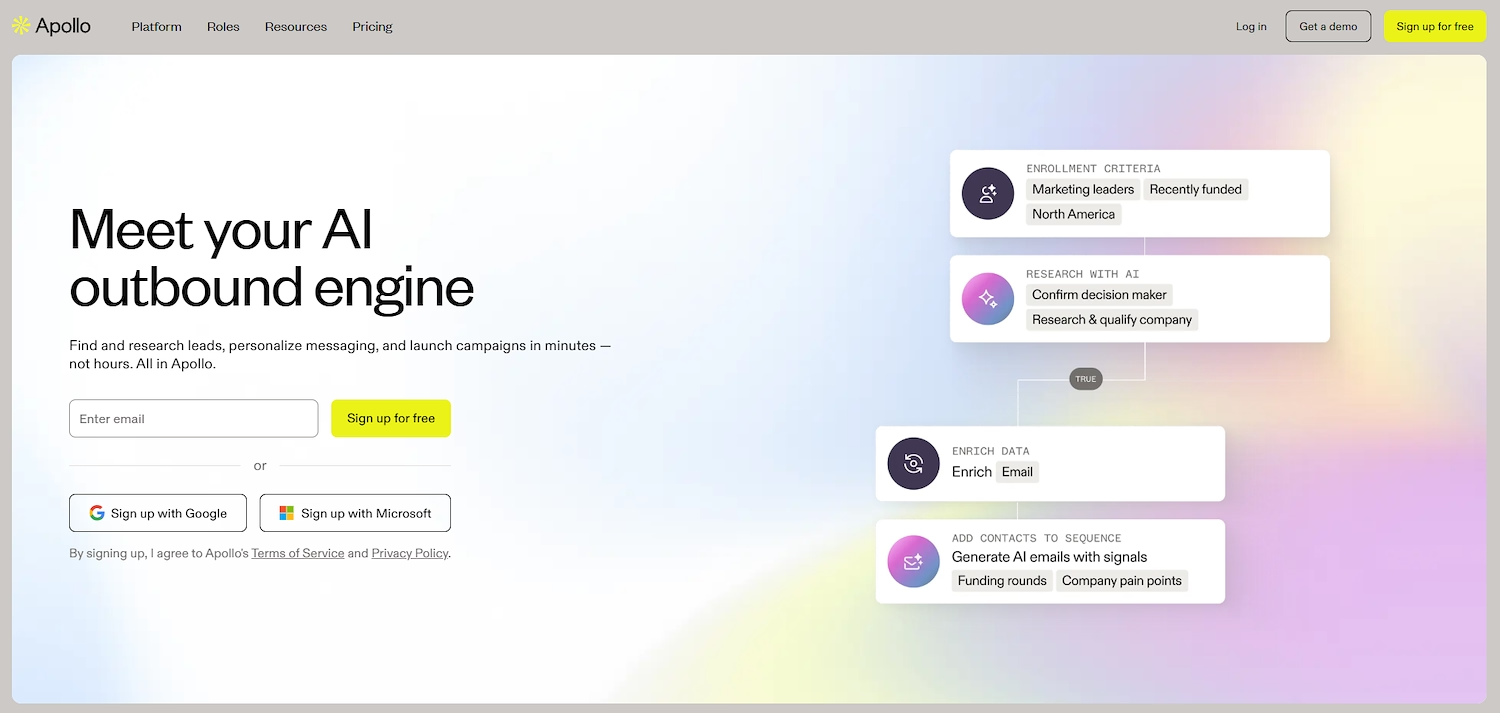
Apollo.io is a sales intelligence and engagement platform. It provides a large database of contacts and companies that teams use to find prospects, confirm contact details, and automate outreach sequences.
The system also offers data on buyer intent to pinpoint accounts ready to purchase. It unifies tools for prospect discovery, communication, and analysis into a single platform.
Apollo.io's Main Features
Maintains a proprietary database with over 275 million contacts and 73 million companies.
Includes a sequencing engine to automate multi-channel outreach across email, phone, and social media.
Surfaces buying intent signals from over 30 data points to identify accounts actively researching solutions.
Offers analytics tools to track open rates, reply rates, and meeting booked rates for outreach campaigns.
How Apollo.io Compares to Detective
Average Review score: 4.7/5 stars based on 8,904 G2 reviews.
Apollo.io offers a database of over 275 million contacts for prospecting. This is different from Detective, which synthesizes research from public sources rather than providing a proprietary contact list.
The platform includes tools to build and automate outreach sequences. Detective prepares the research for outreach but requires a separate tool to execute the campaigns.
It provides an all-in-one system for prospecting, engagement, and analytics. This integrated approach differs from Detective, which focuses solely on the pre-call research and briefing stage.
This tool surfaces buying intent signals based on online activity. This is a different type of signal compared to Detective, which finds specific sales triggers like company news.
Apollo.io's Limitations Compared to Detective
Apollo.io provides raw data that sales teams must analyze themselves. In contrast, Detective automates research and delivers a synthesized brief, which saves reps the time needed to build a sales narrative.
The platform identifies general buyer intent from online activity. This differs from Detective, which finds specific sales triggers like funding news or executive hires that create a clear and timely reason to reach out.
It focuses on engagement tools to automate outreach sequences. This approach does not generate the specific sales narrative or talking points for a call, a core function that Detective provides through its automated research.
Budget and Pricing Considerations
Detective offers a single plan at $50 per seat per month. In contrast, Apollo.io provides a tiered model with a free plan and paid options starting at $49 per user per month. Apollo.io's model offers more flexibility for various budgets, while Detective's flat rate is simpler for teams requiring full access.
5) Lusha
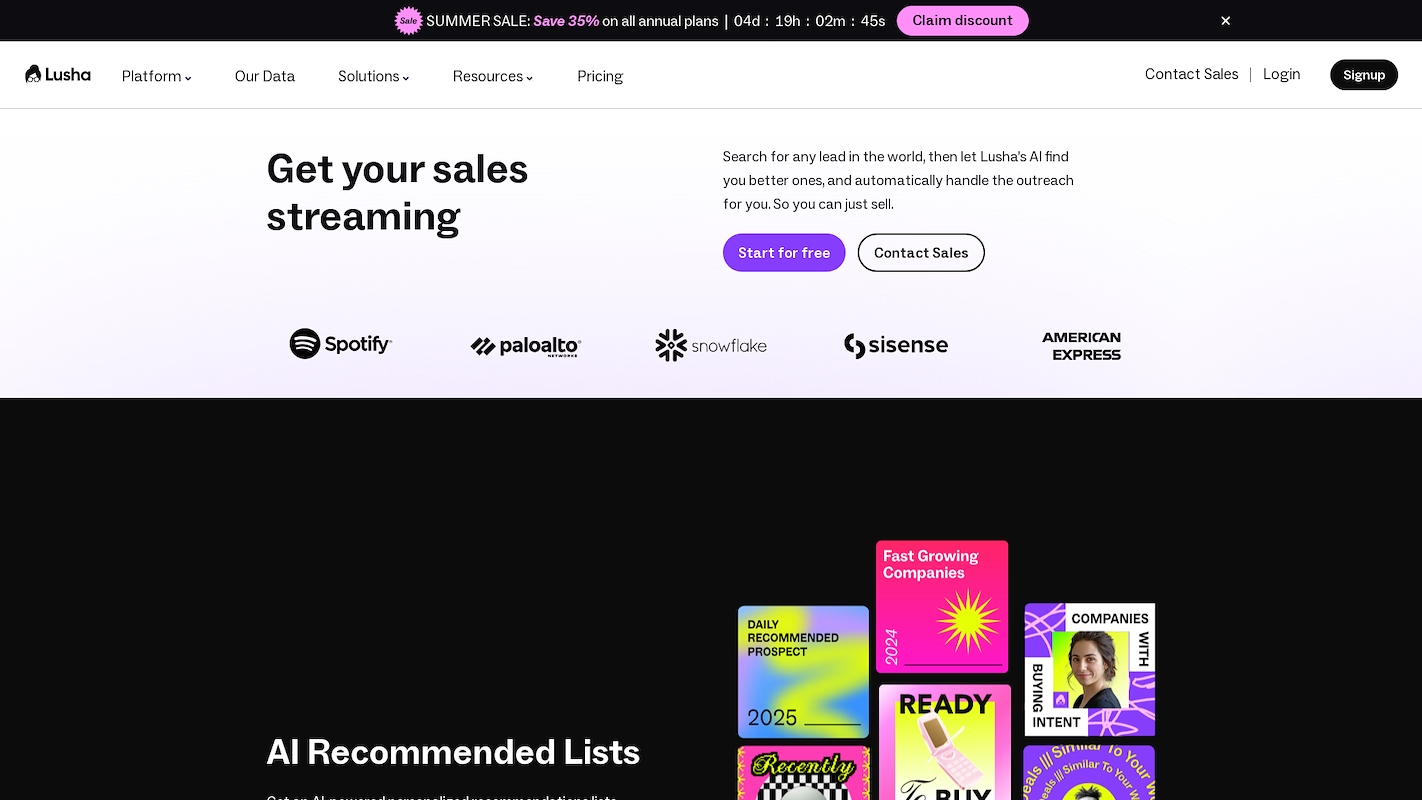
Lusha is a sales intelligence platform that provides B2B contact and company data. Sales professionals use it to find verified email addresses and direct-dial phone numbers, which helps shorten the sales cycle.
Teams also use the tool to build targeted prospect lists and enrich CRM records. This data supports lead qualification and maintains accuracy for outreach campaigns.
Lusha's Main Features
Automates and personalizes email sequences with AI-generated copy.
Records and analyzes sales meetings to provide post-call insights.
Captures contact data directly from LinkedIn and websites via a browser extension.
Offers data certified for GDPR, CCPA, and ISO 27701 & 27001 compliance.
How Lusha Compares to Detective
Average Review score: 4.3/5 stars based on 1,516 G2 reviews.
Lusha provides direct contact information like verified emails and phone numbers. This is different from Detective, which creates a research brief from public data instead of offering a contact database.
It includes tools to automate and personalize email outreach. Detective prepares the research for outreach but does not have a built-in engagement feature.
The platform records and analyzes sales meetings to provide insights after the call. This function is different from Detective, which focuses on pre-call preparation and research.
This tool offers data certified for compliance with GDPR and CCPA. This provides a layer of data governance that is different from Detective's focus on synthesizing public news and information.
Lusha's Limitations Compared to Detective
Lusha provides raw contact data, which means sales reps must conduct their own research. In comparison, Detective automates research to deliver a synthesized brief that prepares reps with a narrative for their outreach.
The tool focuses on contact discovery and does not surface timely sales triggers. Detective, however, finds specific events like funding news, which gives sales teams a clear reason to connect with a prospect.
It helps automate email sequences but does not generate specific talking points for a call. Detective's automated research is designed to produce a sales narrative, giving reps key points to use during conversations.
Budget and Pricing Considerations
Detective offers a single plan at $50 per seat per month. Lusha provides a tiered model with a free plan, a Pro plan at $36 per month, and a Premium plan at $59 per month. This makes Lusha more flexible for various needs, while Detective's flat rate is simpler for teams requiring full access. For detailed pricing, visit Lusha's official website.
Evaluate 11x for Digital Sales Workers
The tools reviewed offer specific features for data enrichment and outreach. If your goal is to use autonomous agents in your sales process, 11x is a relevant option. Consider a demo to see how digital workers can manage GTM operations for your team.
At 11x, we use AI to run your sales playbook. Alice finds accounts, enriches data, and handles outreach, while Julian qualifies leads and books meetings. We replace separate tools for data and engagement by consolidating them into one platform.
Book a demo to see our platform in action.
6) Seamless.AI
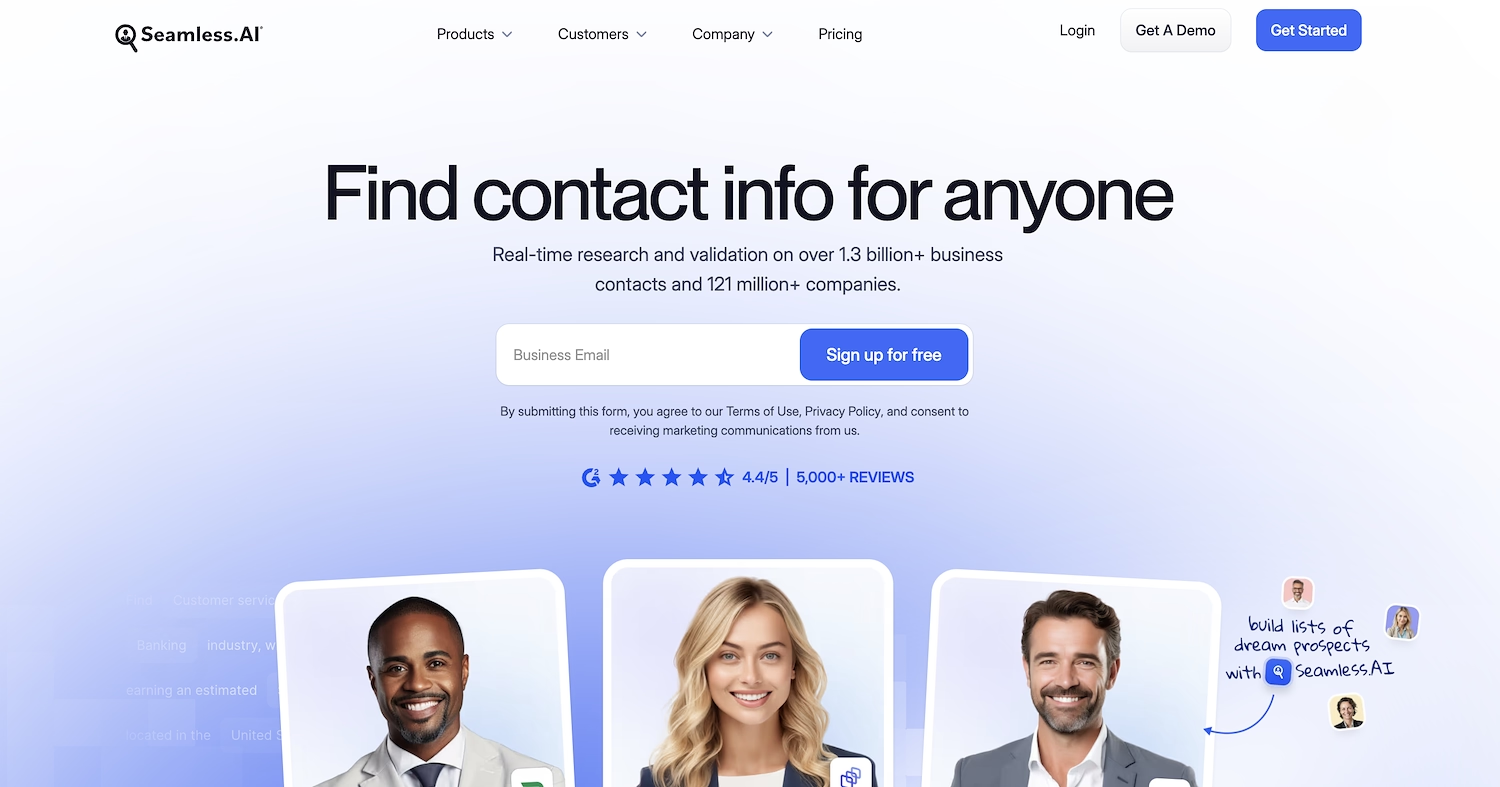
Seamless.AI is a sales intelligence platform with a real-time search engine. It helps sales teams find verified contact data, such as emails and direct dials, for contacts at target accounts. Use cases include prospect list creation and the identification of sales triggers for timely outreach.
Seamless.AI's Main Features
Surfaces buyer intent data to identify prospects who are ready to purchase.
Monitors job changes for customers and prospects and automatically delivers new contact information.
Generates research and personalized messages using its AI Pitch Intelligence feature.
Automates the list-building process to maintain a filled pipeline with its Autopilot function.
How Seamless.AI Compares to Detective
Average Review score: 4.4/5 stars based on 5,067 G2 reviews.
Seamless.AI provides a real-time search engine for contact data. This differs from Detective, which delivers a synthesized research brief instead of a raw database.
Its AI Pitch Intelligence feature generates personalized messages. This contrasts with Detective, which creates a sales narrative from its research for reps to use.
The tool monitors job changes and provides updated contact information. This offers a different type of sales trigger compared to the funding news that Detective surfaces.
An Autopilot function automates list-building to fill the pipeline. This is different from Detective, which automates research for specific accounts to prepare for outreach.
Seamless.AI's Limitations Compared to Detective
Seamless.AI provides raw data that sales reps must analyze. In contrast, Detective automates research to deliver a synthesized brief, which saves reps the time needed to build a sales narrative.
The tool identifies general buyer intent from online activity. This differs from Detective, which finds specific sales triggers like funding news that create a clear and timely reason to reach out.
It focuses on providing contact data and list-building tools. This approach does not generate the specific sales narrative or talking points for a call, a core function that Detective provides through its automated research.
Budget and Pricing Considerations
Detective offers a single plan at $50 per seat per month, providing predictable costs. Seamless.AI uses a custom, quote-based model, so its pricing is not public. For the most accurate information, visit Seamless.AI's official website to get a quote based on your team's needs.
7) UpLead
UpLead is a B2B prospecting tool that provides contact and company data with a focus on accuracy. Teams use it to build targeted lists and find direct contact information for decision-makers. The platform includes real-time email verification to ensure data quality.
UpLead's Main Features
Offers a 95% data accuracy guarantee, backed by real-time email verification.
Includes technographic data to identify prospects based on the technology they use.
Provides buyer intent data to find companies actively researching solutions.
Features a browser extension to capture contact data from websites and LinkedIn profiles.
How UpLead Compares to Detective
Average Review score: 4.7/5 stars based on 911 G2 reviews.
UpLead provides a contact database with a 95% accuracy guarantee. This is different from Detective, which synthesizes research from public sources without offering its own database.
The platform includes technographic and intent data for prospecting. This offers a different way to target accounts compared to Detective's focus on sales triggers from news and company events.
It offers a browser extension to find contact information on websites and LinkedIn. Detective automates research on a given account but does not have a similar tool for on-the-fly data capture.
UpLead's output is raw contact and company data. This contrasts with Detective, which delivers a synthesized brief to prepare reps for calls.
UpLead's Limitations Compared to Detective
UpLead provides raw data, which requires sales reps to conduct their own research. Detective, in contrast, automates the research process to deliver a synthesized brief with a ready-to-use narrative.
The platform focuses on contact discovery and intent signals. It does not surface specific, timely sales triggers like funding announcements, a core feature that Detective provides for outreach timing.
It does not generate a sales narrative or talking points for calls. Detective's main function is to create this story from its research, helping reps personalize their outreach more effectively.
Budget and Pricing Considerations
Detective offers a single plan at $50 per seat per month. UpLead provides a tiered, credit-based model with plans starting at $74 per month. This structure differs from Detective's flat rate, making cost dependent on usage. For detailed pricing, visit UpLead's official website.
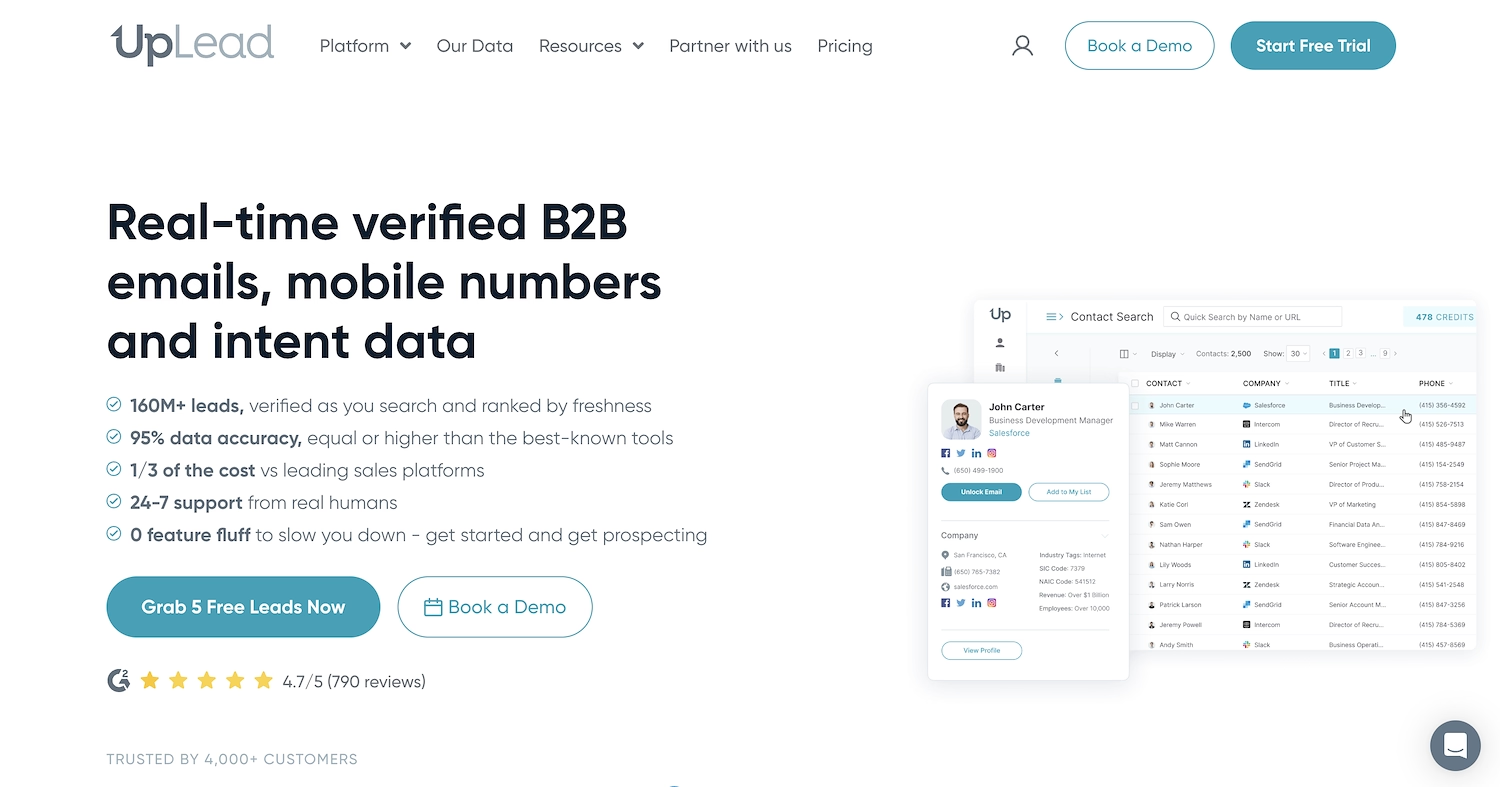
UpLead is a B2B prospecting tool for contact and company data. It provides a 95% accuracy guarantee with its real-time email verification. Teams build targeted lists with filters for technographics and buyer intent, then find direct contact information for key decision-makers.
UpLead's Main Features
Builds targeted lists in real time with more than 50 search filters.
Enriches CRM records with over 40 data points through bulk lookup and live syncing.
Tracks more than 16,000 technology installs per company for technographic targeting.
Offers a REST API for programmatic search, enrichment, and verification.
How UpLead Compares to Detective
Average Review score: 4.7/5 stars based on 797 G2 reviews.
UpLead offers a contact database with a 95% data accuracy guarantee, backed by real-time email verification. This provides a different level of data reliability compared to Detective, which synthesizes information from public sources.
Its technographic data identifies prospects based on their technology stack. This offers a different targeting method from Detective, which focuses on sales triggers like company news.
The tool provides buyer intent data to find companies that actively research solutions. This is a different type of signal from Detective, which finds specific sales triggers like funding news or executive changes.
UpLead's browser extension captures contact data directly from websites and LinkedIn. This feature supports on-the-fly data collection, which is different from Detective's automated research process for a given account.
UpLead's Limitations Compared to Detective
UpLead provides raw data, which requires sales reps to conduct their own research. Detective, in contrast, automates the research process to deliver a synthesized brief with a ready-to-use narrative.
The platform focuses on contact discovery and intent signals. It does not surface specific, timely sales triggers like funding announcements, a core feature that Detective provides for outreach timing.
Its system does not generate a sales narrative or talking points for calls. Detective's main function is to create this story from its research, which helps reps personalize their outreach more effectively.
Budget and Pricing Considerations
Detective offers a single plan at $50 per seat per month, providing predictable costs for unlimited use. UpLead uses a tiered model with a free trial and paid plans starting at $99 per month. While Detective's flat rate is simpler for teams requiring full access, UpLead's structure offers more flexibility for various budgets, though its entry point is higher.
8) Cognism
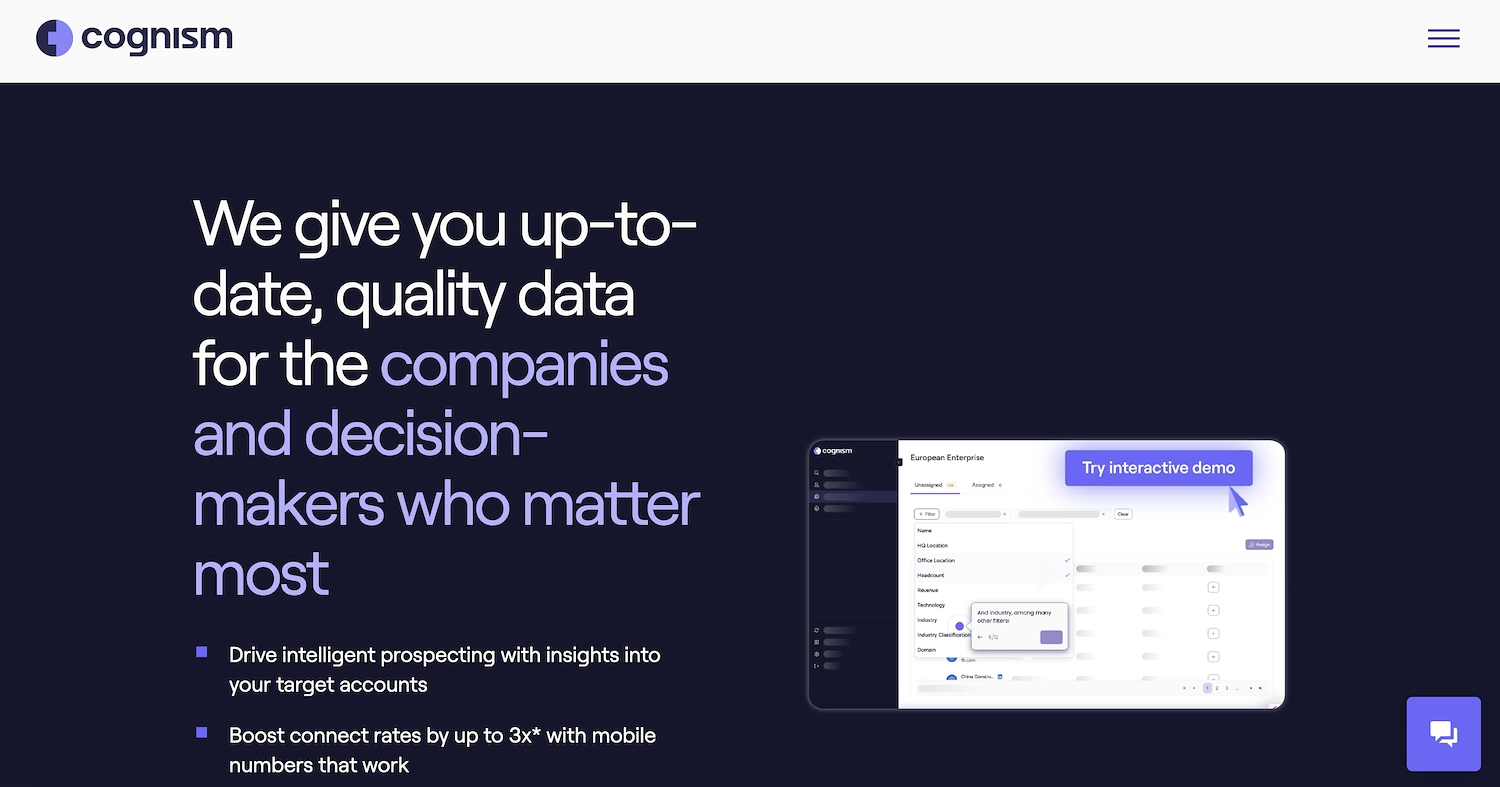
Cognism is a sales intelligence platform that provides data for B2B go-to-market teams. The service focuses on sales triggers and intelligence to help companies find and engage prospects. Teams use the platform to build prospect lists and support outreach campaigns with relevant information.
Cognism's Main Features
Provides a lead builder to create prospect lists from available contact and company data.
Integrates with CRM and marketing automation platforms for data cleaning and enrichment.
Validates leads to ensure contact and company data accuracy.
How Cognism Compares to Detective
Average Review score: 4.6/5 stars based on 1,033 G2 reviews.
Cognism provides a contact database with verified direct dials, with a strong focus on European markets. This is different from Detective, which creates research briefs from public data instead of offering a list of contacts.
It offers GDPR-compliant contact data, which is a key feature for teams that prospect in Europe. Detective synthesizes public news and does not provide this specific data compliance for contact information.
The tool includes a lead builder to create targeted prospect lists directly within the platform. This function differs from Detective, which automates research on existing accounts rather than helping you build new lists.
This platform helps clean and enrich existing CRM records to maintain data accuracy. This is a data management feature that is different from Detective's focus on generating pre-call research briefs.
Cognism's Limitations Compared to Detective
Sales reps receive raw data from Cognism, so they must build the sales story themselves. Detective differs because it automates research and delivers a complete brief with a narrative. This saves preparation time before a call.
The platform focuses on data delivery and does not generate specific talking points for a sales call. This is a main feature of Detective, which turns its research into key points for reps to use in conversations.
While Cognism offers sales triggers, they are presented as separate data points. In comparison, Detective weaves these triggers into a cohesive story. This gives sales teams a clear and immediate reason to reach out to a prospect.
Budget and Pricing Considerations
Detective offers transparent pricing at $50 per seat per month. Cognism uses a custom, quote-based model, so its pricing is not public. For an accurate quote based on your team's needs, visit Cognism's official website.
9) LeadIQ
LeadIQ is a prospecting platform designed to help sales teams find and capture contact data. It focuses on simplifying the process of building prospect lists and verifying information, allowing reps to spend more time on outreach.
LeadIQ's Main Features
Captures contact data from public profiles and websites using a browser extension.
Verifies email addresses and phone numbers to improve data accuracy before outreach.
Tracks job changes and surfaces triggers to help time outreach to previous customers or prospects.
Integrates with CRM platforms to sync contact data and reduce manual entry.
How LeadIQ Compares to Detective
Average Review score: 4.2/5 stars based on 638 G2 reviews.
LeadIQ focuses on capturing contact data with its browser extension. This is different from Detective, which automates research to create a narrative brief for a given account.
The platform provides raw contact information like emails and phone numbers. Detective, in contrast, delivers a synthesized report with talking points instead of a contact list.
It tracks job changes to provide a specific type of sales trigger. This differs from Detective, which surfaces a wider range of triggers like funding news and company initiatives.
LeadIQ helps build prospect lists from scratch. Detective is used to research existing accounts or prospects that have already been identified.
LeadIQ's Limitations Compared to Detective
LeadIQ provides raw contact data, which requires sales reps to conduct their own research. Detective automates this process to deliver a synthesized brief with a ready-to-use narrative.
The platform does not generate a sales story or talking points for calls. This is a core function of Detective, which creates a narrative from its research to help reps personalize outreach.
Its focus is on contact discovery and specific triggers like job changes. It does not surface the broad range of timely sales triggers, such as funding news, that Detective provides.
Budget and Pricing Considerations
Detective offers a single plan at $50 per seat per month. LeadIQ provides a tiered model with a free plan and paid options that scale with features and credits. This makes LeadIQ flexible for different needs, while Detective's flat rate is simpler. For details, visit LeadIQ's pricing page.
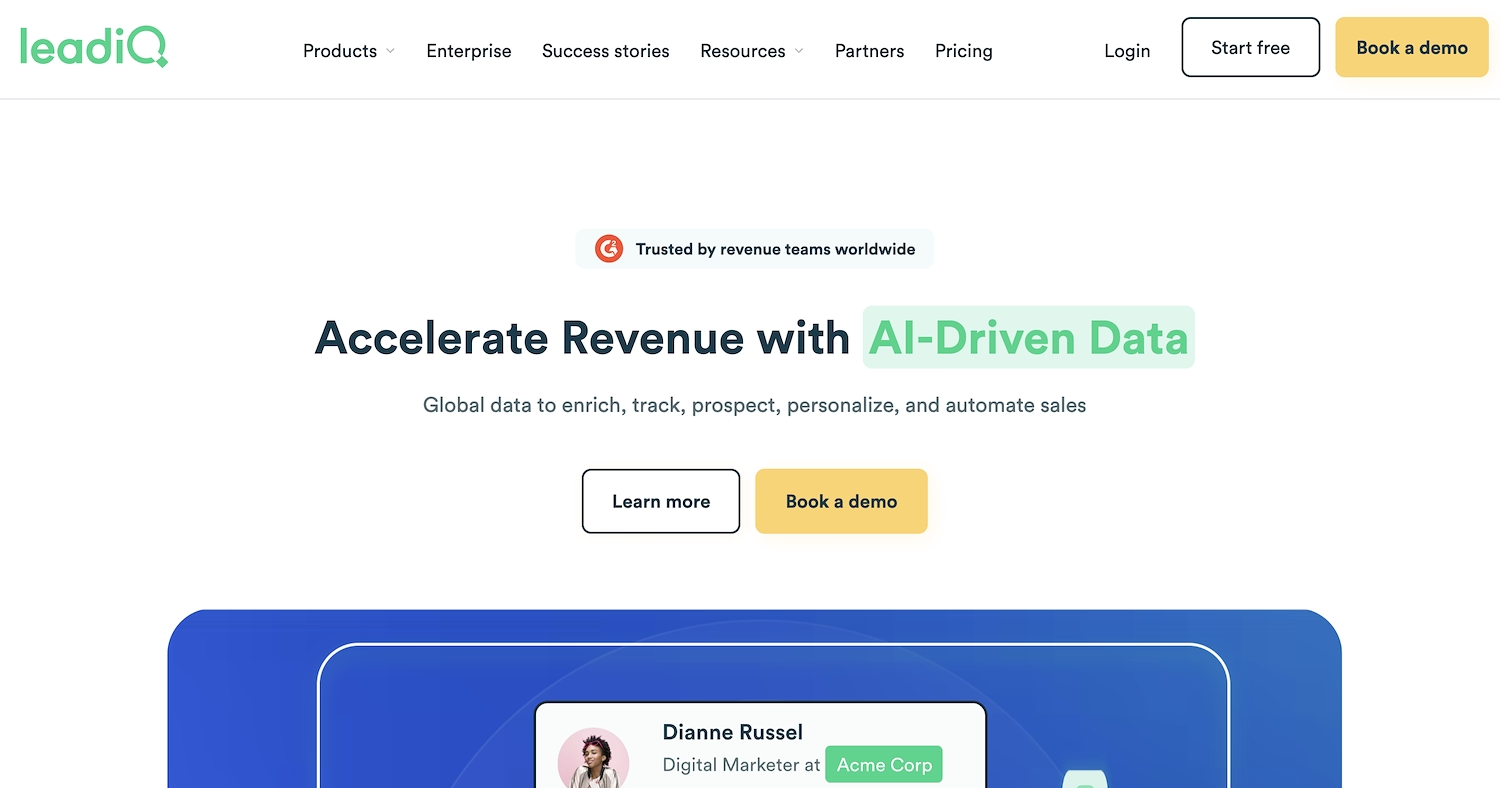
LeadIQ is a platform for sales teams to find and capture contact data. It assists with prospect list creation and information verification, which lets representatives focus on outreach. The tool also surfaces sales triggers to help time communication with prospects and customers.
LeadIQ's Main Features
Builds lead lists using contact and company data.
Integrates with CRM and marketing automation platforms.
Searches for available contact, company, and industry data.
Monitors leads for changes and sales triggers.
How LeadIQ Compares to Detective
Average Review score: 4.2/5 stars based on 1,097 G2 reviews.
LeadIQ offers a browser extension to capture contact data directly from websites and public profiles. This is different from Detective, which automates research for a specific account instead of capturing data on the fly.
The platform verifies email addresses and phone numbers in real-time. This provides a layer of data accuracy for outreach that is different from Detective's focus on research synthesis.
It tracks job changes for previous customers and prospects, providing a specific sales trigger. This differs from Detective, which surfaces a broader range of triggers like funding news or company-wide initiatives.
The tool provides a tiered pricing model, including a free plan. This offers more flexibility for different team sizes and budgets compared to Detective's single, flat-rate plan.
LeadIQ's Limitations Compared to Detective
Sales reps receive raw contact data from LeadIQ and must build the sales story themselves. Detective differs because it automates research and delivers a complete brief with a narrative, which saves preparation time.
Its output is a list of contacts, not a sales narrative. A sales rep might need more time to prepare for a call, unlike with Detective, which provides a synthesized brief with key talking points.
While it tracks job changes, some users may find these triggers less actionable. Detective surfaces a wider range of timely events, like funding news, that provide a clearer reason to connect.
Budget and Pricing Considerations
Detective offers a single plan at $50 per seat per month. LeadIQ provides a tiered model with a free plan, an Essential plan at $45 per month, and a Pro plan at $89 per month. Detective's flat rate is predictable for unlimited use, while LeadIQ's structure offers more flexibility for various budgets.
10) People Data Labs
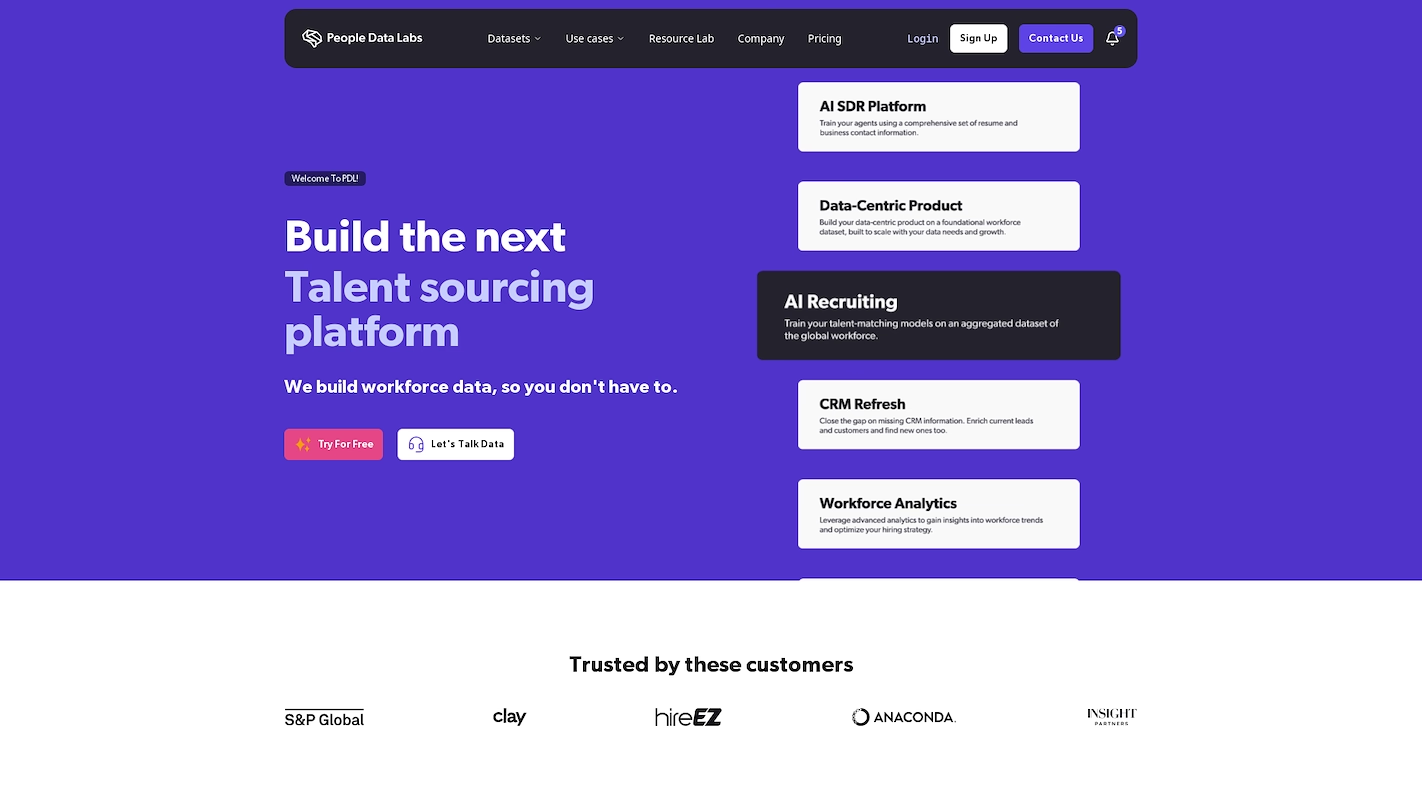
People Data Labs provides B2B data primarily for developers and data scientists. It offers datasets with information on companies and people to power other applications. The service delivers raw data through an API for enrichment, discovery, and intelligence use cases, rather than a front-end platform for sales teams.
People Data Labs's Main Features
Offers an API for developers to build products, enrich profiles, and power predictive models.
Provides raw B2B datasets to enrich person and company records at scale.
Delivers data through a well-documented API designed for engineering and data science teams.
Includes a free API key for developers to begin enriching profiles without a credit card.
How People Data Labs Compares to Detective
Average Review score: 4.6/5 stars based on 16 G2 reviews.
People Data Labs provides raw B2B data through an API for developers and data scientists. This is different from Detective, which offers a front-end platform for sales teams to get research briefs.
It offers a free API key for developers to test data enrichment. Detective, in comparison, has a single paid plan and does not provide a free developer access point.
The tool's datasets help power predictive models and AI applications. This contrasts with Detective, which synthesizes information into a narrative brief for immediate sales use.
This platform enriches person and company records at scale. Detective, on the other hand, automates research to create a story with talking points, not just raw data points.
People Data Labs's Limitations Vs. Detective
People Data Labs is an API-first tool for developers, so it does not have a user interface for sales teams. Detective, in contrast, offers a platform that gives sales reps research briefs without needing technical skills.
The tool delivers raw B2B data that requires analysis. This is different from Detective, which automates research and provides a synthesized story with talking points. This helps sales reps prepare for calls more quickly.
This service focuses on data enrichment and does not surface specific sales triggers like funding news. Detective, however, finds these timely events and builds a narrative around them, which gives a clear reason to contact a prospect.
Budget and Pricing Considerations
Detective offers a single plan at $50 per seat per month, providing predictable costs. People Data Labs uses a custom, quote-based model for its API services, and pricing is not public, though it offers a free API key for developers. For a quote based on your data needs, visit the People Data Labs official website.
Which One Should You Go With?
Many variables factor into the selection of a Detective alternative, based on your team's specific workflow and budget. This guide reviewed several options to help you create a shortlist for a more detailed evaluation.
If your goal is to use autonomous agents in your sales process, 11x is a relevant option. Our digital workers manage GTM operations, find prospects, book meetings, and consolidate your sales stack into a single platform.




